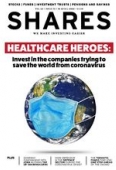Archived article
Please note that tax, investment, pension and ISA rules can change and the information and any views contained in this article may now be inaccurate.
The thematic funds that stay one step ahead of the crowd

Many investors are jumping on investment themes too late to make good money, or they are misunderstanding how you might profit from a theme. Steve Wreford, a portfolio manager at Lazard Asset Management, calls it a narrative fallacy.
‘You often hear fantastic stories about something that will happen but which is barely related to underlying investment returns.
‘Robotics is a good example. Yes, robots are going to be everywhere in the next 10 years. But does that mean an investor should buy a robotics ETF or themed fund filled with robot manufacturers?
‘If robots are going to be everywhere it’s because they are going to become inexpensive. If prices are going to collapse, why do you want to own the companies that make them? It doesn’t make any sense.’
Wreford is part of the team running thematic funds at Lazard, who he believes are one step ahead in identifying not only the opportunities but also where the best money will be made.
Lazard takes a view on how the world will develop over the next decade. It then groups together insights about structural and secular change to form themes. Importantly, these themes evolve, they can be removed for valuation reasons, they may lose relevance or they are replaced by new ideas.
WAYS TO PLAY
Investors can tap into its strategy via two funds. The first is Lazard Global Thematic (B464177) which generally has eight to 12 themes, each of which is populated with eight to 10 stocks worth $1bn or more and equally weighted. Wreford says this is popular with more cautious investors.
The six ideas from this group offering the strongest potential returns are used to populate Lazard Global Thematic Focus (BKX9F08), essentially a best ideas sister fund.
‘Our themes appear well placed as we emerge from the coronavirus pandemic. In the past few weeks we’ve been able to purchase shares in some of the best companies in the world for these themes, and at discounted valuations to historical standards.’
FOCUS ON THE LONG-TERM
The portfolio manager says conversations with company directors focus on the future not the present. ‘We aren’t asking how business is today; we’re asking what will be the biggest structural change in your industry over the next three to 10 years.’
This process led to defining one of the themes in the funds’ portfolios called automated efficiencies.
Imagine there are 100 robots in a factory but one is twice as efficient as the others. Today all the robots might stream data back, the team look at it and try to work out how to improve efficiency, which is a slow process.
‘What you really want is for that robot to share automatically what it is doing differently with all the other robots so overnight raise the returns of the other 99 robots in the factory. Your efficiencies ought to be generated without any human involvement. That will be called a “dark factory” – no humans in it,’ explains the portfolio manager.
‘We know this will be real because companies are investing billions of dollars to make it happen. We have very high conviction that this is a genuine theme.’
SEEKING BROAD OPPORTUNITIES
Having established this theme, the next step for the team is to identify the companies best placed to profit. Lazard analysed previous trends across multiple sectors and realised it could learn a lesson from how the smart phone sector developed.
While you might have thought handset, battery or screen makers were the best places to invest to play the smart phone theme, the correct answer would have been investing in the companies responsible for the operating systems – namely the global duopoly that is Google (Android) and Apple (iOS).
‘That’s why we are looking for the operating systems that will join those robots together in the factory – and we know who the makers are.’
They include Rockwell Automation and Fanuc. ‘Shares in Fanuc have been under pressure because they’ve spent the last three years investing heavily. Short term investors don’t like it when companies invest a lot, yet Fanuc are building an operating system as I’ve described, called the Field System.’
To get the most from a theme, Lazard’s analysts search for as many different industries as possible which could embrace it. For example, tractor maker John Deere wants its agricultural equipment to talk to each other on its own operating system.
In the property space, Johnson Controls is flagged as an important player in this theme. ‘It goes to a building owner and says “if you allow us to put in our operating system we will guarantee you 20% off your energy bill over the next 20 years”. All the buildings on that system talk to each other and learn how to run more efficiently.’
CONSUMERS AND FINTECH
Other themes in the funds include the empowered consumer where Lazard believes there are common characteristics for businesses to be a winner for consumers in 2030.
They will need to be aligned with consumers’ ethical values, have a digital relationship with each customer, and both make and sell a product. Stocks aligned to this theme in its portfolio include electronics giant Sony and video games specialist Activision Blizzard.
The digital runway theme focuses on the fintech opportunities in emerging markets. Wreford says there is a large unbanked population in places such as Indonesia who are ‘crying out’ for new financial services.
‘Companies addressing this market can leapfrog over the technology and processes used in the West. No-one will build a bank branch.
‘We invest in Bank Rakyat which has guys with iPads, travelling in speed boats to different places in Indonesia. They recruit grocery stores to be agents and they’ve bought a satellite which means they have their own infrastructure to connect everyone, thereby building a banking network.’
LOOKING BEYOND THE OBVIOUS
A lot of people talk about certain attributes which makes companies special such as ones that benefit from network effects – the more people use their services, the richer the environment to make money. Ebay being one example of this in action.
The Lazard portfolio manager says the benefits of these traits are already priced in by the market, which is why it is important to look further into the future to spot ways to profit from certain themes. Other examples of themes already factored into share prices include internet of things, digitisation, consumer behavioural shifts, moving software services to the cloud, and disruptive technologies.
Just take the theme of data – everyone now seems fully aware that companies with access to lots of data can use it to learn about customers. The big concern is whether this data is being used in a good or bad way and how that shapes prospects for companies.
‘We want to benefit from data-orientated companies with networks but also avoid upcoming regulation of these companies that could crush their business models. For example, we believe Facebook will ultimately be responsible for the underlying content and so will be valued (much less) as a publisher and not a tech platform,’ explains Wreford.
He says businesses such as Wolters Kluwer are more interesting when it comes to the theme of data, networks and artificial intelligence (AI). ‘The legal profession uses its databases. Rather than spending a week looking for the right case study to support a legal case, let Wolters’ AI do it within an hour.’
PAST AND FUTURE
Lazard Global Thematic Fund has delivered 15.7% total return over the past five years versus 10.8% from the Investment Association global sector, according to FE Fundinfo. The Focus version of the Lazard fund only recently launched so there isn’t enough data to judge its performance.
‘Coronavirus represents a catalyst that is revealing underlying conditions that have been bubbling under the surface for a while and accelerating changes we’ve been anticipating,’ says Wreford.
‘Politics will play a greater role in markets after the crisis in terms of how money is allocated. Most of our themes and companies are long-term beneficiaries of current events.’
Important information:
These articles are provided by Shares magazine which is published by AJ Bell Media, a part of AJ Bell. Shares is not written by AJ Bell.
Shares is provided for your general information and use and is not a personal recommendation to invest. It is not intended to be relied upon by you in making or not making any investment decisions. The investments referred to in these articles will not be suitable for all investors. If in doubt please seek appropriate independent financial advice.
Investors acting on the information in these articles do so at their own risk and AJ Bell Media and its staff do not accept liability for losses suffered by investors as a result of their investment decisions.

 magazine
magazine









